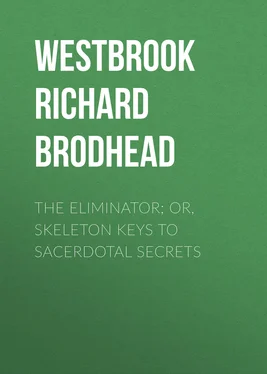Richard Westbrook - The Eliminator; or, Skeleton Keys to Sacerdotal Secrets
Здесь есть возможность читать онлайн «Richard Westbrook - The Eliminator; or, Skeleton Keys to Sacerdotal Secrets» — ознакомительный отрывок электронной книги совершенно бесплатно, а после прочтения отрывка купить полную версию. В некоторых случаях можно слушать аудио, скачать через торрент в формате fb2 и присутствует краткое содержание. Жанр: foreign_prose, foreign_religion, Философия, foreign_psychology, foreign_antique, на английском языке. Описание произведения, (предисловие) а так же отзывы посетителей доступны на портале библиотеки ЛибКат.
- Название:The Eliminator; or, Skeleton Keys to Sacerdotal Secrets
- Автор:
- Жанр:
- Год:неизвестен
- ISBN:нет данных
- Рейтинг книги:3 / 5. Голосов: 1
-
Избранное:Добавить в избранное
- Отзывы:
-
Ваша оценка:
- 60
- 1
- 2
- 3
- 4
- 5
The Eliminator; or, Skeleton Keys to Sacerdotal Secrets: краткое содержание, описание и аннотация
Предлагаем к чтению аннотацию, описание, краткое содержание или предисловие (зависит от того, что написал сам автор книги «The Eliminator; or, Skeleton Keys to Sacerdotal Secrets»). Если вы не нашли необходимую информацию о книге — напишите в комментариях, мы постараемся отыскать её.
The Eliminator; or, Skeleton Keys to Sacerdotal Secrets — читать онлайн ознакомительный отрывок
Ниже представлен текст книги, разбитый по страницам. Система сохранения места последней прочитанной страницы, позволяет с удобством читать онлайн бесплатно книгу «The Eliminator; or, Skeleton Keys to Sacerdotal Secrets», без необходимости каждый раз заново искать на чём Вы остановились. Поставьте закладку, и сможете в любой момент перейти на страницу, на которой закончили чтение.
Интервал:
Закладка:
4th. Our fourth article of impeachment under the general charge is, that the pulpit is the great promoter of skepticism called infidelity, in that it insists upon the belief of dogmas which are absurd upon their face, such as the miraculous conception of Jesus, the dogma of the Trinity, the origin and fall of man, vicarious atonement, predestination, election and reprobation, eternal torture for the majority, and many other absurdities which no rational mind can now consistently accept.
True, these dogmas may be found in the Bible; and when men ate told with weekly reiterations that the Bible is purely divine, supernatural, and infallible, and they find that it is purely human, natural, and very fallible, they cannot believe the Bible, though they find many inspiring and helpful things in it. When ministers tell thinking men that they must believe all or reject all, they accept the foolish alternative and reject all. And so it might be further shown how, in very many ways, the pulpit is the great promoter of skepticism and infidelity, and that the professed teachers of religion are its greatest enemies, its most effective clogs and successful antagonists. No wonder that the most thoughtful and intelligent men and women in every community have drifted away from the popular faith, and are anxiously inquiring, What next?
President Thomas Jefferson, in writing to Timothy Pickering, well said:
“The religion-builders have so distorted and deformed the doctrines of Jesus, so muffled them in mysticisms, fancies and falsehoods, have caricatured them into forms so monstrous and inconceivable, as to shock reasonable thinkers to revolt them against the whole, and drive them rashly to pronounce its founder an impostor.” Writing to Dr. Cooper, he said: “ My opinion is that there would never have been an infidel if there had never been a priest. ”
We would not abolish the office, or, if you please, the profession, of public moral teacher , but we would banish from the world the caste idea, the holy-order pretence. When simple-minded young men and grave and surpliced bishops talk about taking “holy orders,” sensible and thoughtful men know that they are talking holy nonsense. No man has a right to assume that he is more holy than other men, or that he has authority to exercise religious functions that other men have not.
Nor have we any objection that moral teachers should be paid for their services as other teachers are paid; but when educated men can afford to teach without pecuniary compensation, we think it would be well for them to do so; and when the teacher of morals adopts the example of St. Paul, “working with his own hands” and “living in his own hired house,” we think the world will be the better for it. Let us hope that the day will soon dawn when clergymen will consider themselves moral teachers only, and for ever repudiate the false pretence of special authority and priestly sanctimoniousness, and clearly understand that mediocrity and stupidity will not much longer be tolerated because of the so-called sacredness of a profession.
That the estimate here made of sacerdotalists may not seem extreme and unjustifiable, I add the testimony of one of the most honored ecclesiastics of the Established Church of England, Canon Farrar, who in a recent sermon on priestcraft said: “In all ages the exclusive predominance of priests has meant the indifference of the majority and the subjection of the few. It has meant the slavery of men who will not act, and the indolence of men who will not think, and the timidity of men who will not resist, and the indifference of men who do not care.” Alas that “holy hands” should so often be laid “upon skulls that cannot teach and will not learn”!
Let me here quote from Professor Huxley an admirable statement of the facts in the case:
“Everywhere have they (sacerdotalists) broken the spirit of wisdom and tried to stop human progress by quotations from their Bibles or books of their saints. In this nineteenth century, as at the dawn of modern physical science, the cosmogony of the semi-barbarous Hebrew is the incubus of the philosopher and the opprobrium of the orthodox. Who shall number the patient and earnest seekers after truth, from the days of Galileo until now, whose lives have been embittered and their good name blasted by the mistaken zeal of bibliolaters? Who shall count the host of weaker men whose sense of truth has been destroyed in the effort to harmonize impossibilities; whose life has been wasted in the attempt to force the generous new wine of science into the old bottles of Judaism, compelled by the outcry of the same strong party? It is true that if philosophers have suffered, their cause has been amply avenged. Extinguished theologies lie about the cradle of every science as the strangled snakes beside that of Hercules; and history records that whenever science and orthodoxy have been fairly opposed, the latter has been forced to retire from the lists, bleeding and crushed if not annihilated, scotched if not slain. But orthodoxy learns not, neither can it forget; and though at present bewildered and afraid to move, it is as willing as ever to insist that the first chapter of Genesis contains the beginning and the end of sound science, and to visit with such petty thunderbolts as its half-paralyzed hands can hurl those who refuse to degrade nature to the level of primitive Judaism.” “Religion,” he also elsewhere writes, “arising like all other knowledge out of the action and interaction of man’s mind, has taken the intellectual coverings of Fetishism, Polytheism, of Theism or Atheism, of Superstition or Rationalism; and if the religion of the present differs from that of the past, it is because the theology of the present has become more scientific than that of the past; not because it has renounced idols of wood and idols of stone, but it begins to see the necessity of breaking in pieces the idols built up of books and traditions and fine-spun ecclesiastical cobwebs, and of cherishing the noblest and most human of man’s emotions by worship, ‘for the most part of the silent sort,’ at the altar of the unknown and unknowable ”… “If a man asks me what the politics of the inhabitants of the moon are, and I reply that I know not, that neither I nor any one else have any means of knowing, and that under these circumstances I decline to trouble myself about the subject at all, I do not think he has any right to call me a skeptic.” Again: “What are among the moral convictions most fondly held by barbarous and semi-barbarous people? They are the convictions that authority is the soundest basis of belief; that merit attaches to a readiness to believe; that the doubting disposition is a bad one, and skepticism a sin; and there are many excellent persons who still hold by these principles.”… “Yet we have no reason to believe that it is the improvement of our faith nor that of our morals which keeps the plague from our city; but it is the improvement of our natural knowledge. We have learned that pestilences will only take up their abode among those who have prepared unswept and ungarnished residences for them. Their cities must have narrow, un watered streets full of accumulated garbage; their houses must be ill-drained, ill-ventilated; their subjects must be ill-lighted, ill-washed, ill-fed, ill-clothed; the London of 1665 was such a city; the cities of the East, where plague has an enduring dwelling, are such cities; we in later times have learned somewhat of Nature, and partly obey her. Because of this partial improvement of our natural knowledge, and that of fractional obedience, we have no plague; but because that knowledge is very imperfect and that obedience yet incomplete, typhus is our companion and cholera our visitor.”
CHAPTER III. THE FABULOUS CLAIMS OF JUDAISM
Интервал:
Закладка:
Похожие книги на «The Eliminator; or, Skeleton Keys to Sacerdotal Secrets»
Представляем Вашему вниманию похожие книги на «The Eliminator; or, Skeleton Keys to Sacerdotal Secrets» списком для выбора. Мы отобрали схожую по названию и смыслу литературу в надежде предоставить читателям больше вариантов отыскать новые, интересные, ещё непрочитанные произведения.
Обсуждение, отзывы о книге «The Eliminator; or, Skeleton Keys to Sacerdotal Secrets» и просто собственные мнения читателей. Оставьте ваши комментарии, напишите, что Вы думаете о произведении, его смысле или главных героях. Укажите что конкретно понравилось, а что нет, и почему Вы так считаете.












